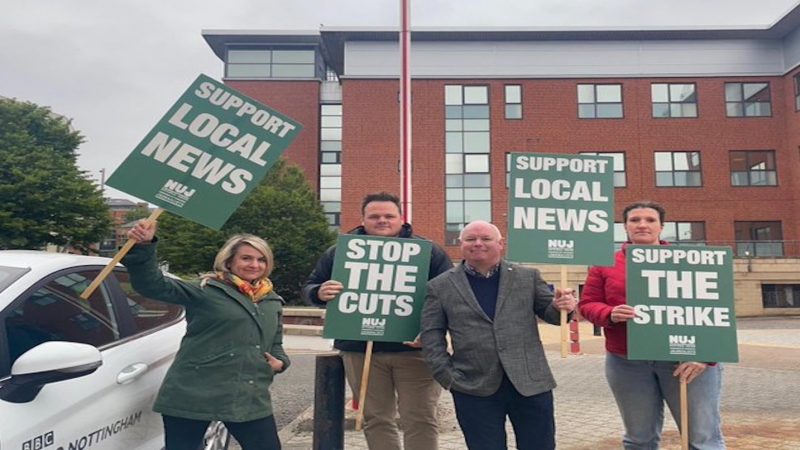'Journalists are striking in defence of services that are valued by communities across the country'

Over 1,000 BBC journalists are walking out today and tomorrow in their second wave of strike action against plans to drastically reduce local radio services across England.
In an industrial dispute not about pay, but about protecting an important public service, strikers are hoping to save radio programming that provides a valuable, localised source of information and entertainment to communities across the country.
The campaign is fighting to prevent the BBC from making local radio stations share programmes from 2pm and at weekends, as part of the BBC’s Digital First strategy for England. This would reduce local radio shows from 39 to 20, and replace local programmes with larger regional shows.
Initial strike action started in March and since then negotiations with the BBC have stalled, according to the union for journalists NUJ, who said the BBC proposals have failed to address concerns about the impact of having fewer services and an increase in shared programmes.
The latest strikes follow a vote of no confidence in the BBC Local senior leadership team passed by BBC staff last week, with 93% voting that they no longer had trust in the team amid the ongoing dispute.
The BBC wants to invest more into digital content, mainly the BBC News and BBC Sounds app and, over time, into Iplayer specific content, however the union pointed out that many stories on these digital platforms actually originate from local radio.
National broadcasting organiser, Paul Siegert, believed the changes will ‘destroy’ access to local radio, affecting the loyal 5.7 million local radio listeners across the country.
“48 hours of weekly local radio programming is a disservice to the 5.7m weekly listeners who tune into BBC local radio,” said Siegert.
“Journalists are striking in defence of services that are valued by communities across the country.
“We do not oppose change within the BBC but believe the manner in which the Digital First strategy is being enforced will destroy access to relevant, local radio that so many rely on.
“This 48-hour strike is about journalists standing up for local radio services, and the public have rallied behind members in their fight to keep local radio local.”
The union warned that regional evening BBC News in England could be replaced by Garden Rescue or the Bidding Room shows over the next two days, as regular presenters join picket lines in protest.
Ronnie Wood of the Rolling Stones expressed his support for the campaign last month backstage at the Albert Hall when he held a sign saying ‘keep BBC local radio local’.
In the UK, 89% of adults tune in to live, linear radio every week despite a decline in listeners to BBC Local Radio due to changing audience habits.
The NUJ is also holding a lobby of parliament today, 7 June, with MPs at the House of Commons.
Hannah Davenport is trade union reporter at Left Foot Forward
(Photo credit: NUJ / Twitter)
Left Foot Forward’s trade union reporting is supported by the Barry Amiel and Norman Melburn Trust

Left Foot Forward doesn't have the backing of big business or billionaires. We rely on the kind and generous support of ordinary people like you.
You can support hard-hitting journalism that holds the right to account, provides a forum for debate among progressives, and covers the stories the rest of the media ignore. Donate today.



